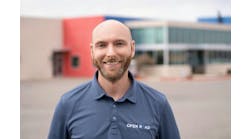It was curious; lots of facts and figures are tabulated for these profiles, but in listing the number of customer vehicles they get per week, one shop had added a subcategory called “Interlock clients.” Are those cars that got stuck together? People who can’t get out of their vehicles? Two cars with the same key?
Ingenious, but … rife with potential awkwardness. The Interlock tests a driver’s sobriety before allowing the ignition to work. And since they aren’t clients by choice, how does Haglin convince a group of doubtlessly ill-tempered folk into becoming pleased patrons?
Not everyone was on board when she first proposed this a few years ago. “Everybody just said, ‘but they’re all drunks,’” recalls Haglin. “I explained that they’re not, they’re just people who got caught. In all the time we’ve been doing this, I can honestly say we’ve only had two true alcoholics who shouldn’t ever drive till they’ve quit drinking. Otherwise they’re just regular people. You just have to be patient with them and explain the system: it’s not Haglin Automotive that’s against them; we’re here to help.”
But that last item is getting quicker all the time with the shop’s recent adoption of a Bolt-On Technology program. A software/hardware system that ties lots of functions together—communications, scheduling, inspections -- it has greatly improved efficiency.
“Then the technician sends the checklist up to the front desk, where they start right away on the estimate,” says Haglin. “Techs can write notes straight into the invoice that tells the front desk what the issues are, like someone came in with an overheat, etc., so all the info is right there and the technician doesn’t have to run back and forth with all the paperwork. It all magically just happens,” she laughs.
“For the customer, (the system) has electronic signature for the final invoice; weIt’s clear the Haglins throw themselves into these ventures with great enthusiasm; one of their longest projects — and possibly longest lasting — has been a succession plan. “It all goes back to an ATI seminar,” relates Haglin. “Of course we thought they were talking about retirement and getting out of the business. But after listening some more, it became a paradigm shift for us; they were talking about a transition from working in the business to working on the business--basically being more efficient so we could get more time away.”
Right now the Haglins are working on listing all the jobs that each of them do and how to delegate them. “It sounds simple, but trust me, the list is long. It’s the little things that add up. Then you have to train someone else to do what you’ve done for years. Right nowThe succession planning has been going on for two years now; it’s not something to be taken lightly, Haglin explains. “The other part we’ve been working on for even longer is finding the right people. That has been the biggest challenge. Right now we’re real excited; we have a crew that we think is going to be ‘it.’ Now it’s a matter of fine tuning them to work really well as a team.”
It’s clear the Haglins pride themselves on not responding to the market, but










